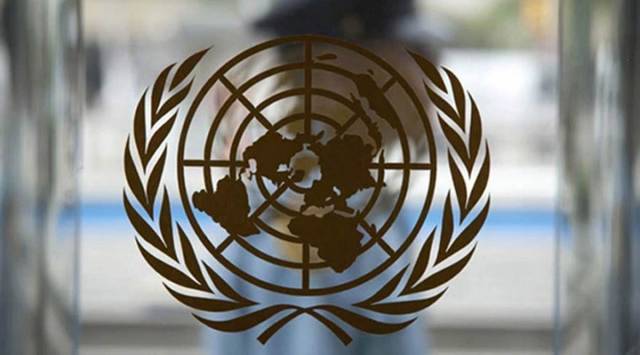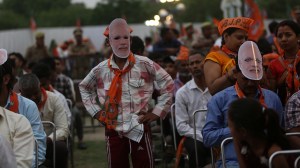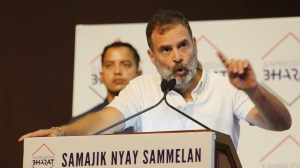- India
- International
When India challenged the UN Charter
In 1946, India successfully challenged a clause in the document that allowed countries to hide human rights violations under the guise of national sovereignty.
 India, in partnership with the UN Department of Peacekeeping Operations and the Department of Operational Support, has been working towards developing the mobile tech platform.
(File)
India, in partnership with the UN Department of Peacekeeping Operations and the Department of Operational Support, has been working towards developing the mobile tech platform.
(File)By Miloon Kothari
“We the Peoples of the United Nations determined…to reaffirm faith in fundamental human rights, in the dignity and worth of the human person, in the equal rights of men and women and of nations large and small”(Preamble UN Charter)
“The Purposes of the United Nations are…To achieve international cooperation in solving international problems of an economic, social, cultural, or humanitarian character, and in promoting and encouraging respect for human rights and for fundamental freedoms for all without distinction as to race, sex, language, or religion” (Article 1(3))
“Nothing contained in the present Charter shall authorize the United Nations to intervene in matters which are essentially within the domestic jurisdiction of any state or shall require the Members to submit such matters to settlement under the present Charter” (Article 2(7))
The year is 1946. South Africa has adopted a legislation, “The Asiatic Land Tenure and Indian Representation Act” (also known by those opposed to it as the Ghetto Act) that legalised the discrimination faced by Indians in South Africa through the restriction of their rights to purchase land. Jawaharlal Nehru had just become the Vice-President of the Interim Government of India.

In consultation and at the behest of Mahatma Gandhi, he decided to internationalise the issue of the racist law in South Africa by approaching the UN General Assembly (UNGA). In a series of events that then unfolded, including a memorable first session of the UNGA (1946), India succeeded in challenging the “domestic jurisdiction” and “sovereignty” clause of the UN Charter (Article 2(7)) under which South Africa could justify its racist treatment of Indians living in South Africa.
As we mark, in 2020, the 75th anniversary of the founding document of the United Nations, the UN Charter, we are justifiably recalling its main strengths including the call on all states to demonstrate “universal respect for, and observance of human rights” and the call for justice and solidarity such that states must take “joint and separate actions” towards respect for human rights.
At the same time, we need to reflect on the remarkable achievement of India in confronting a major weakness of the UN Charter – the clause that permitted countries to hide human rights violations under the cloak of “national sovereignty”.
In the nascent years of the UN, Mahatma Gandhi and Jawaharlal Nehru requested Vijaya Lakshmi Pandit to head the Indian delegation to the first session of the UNGA, with the express instructions to raise the issue of racial practices against the Indian minority in South Africa. In face of fierce opposition from the Allied countries, India succeeded in challenging Article 2(7)) of the UN Charter by having a resolution passed that sought to censure South Africa for its racist treatment of Indians living in South Africa.
Prior to her departure from India, Gandhiji asked to see Pandit and explained (as related in her autobiography) the importance of India raising the discrimination issue at the UNGA. He insisted, moreover, that the conduct of the Indian delegation be based solely on the understanding that he envisaged the UN as a place in which friendships between nations were cemented, where discussion and debate were kept on the highest level, and truth and ethics were the guidelines. For Gandhiji, these principles were to be adhered to even in the dealings with the South African delegations especially their Prime Minister and leader of their delegation, Field Marshal Jan Smuts.
In his brief to Pandit, Nehru reminded her “that we were inheritors of the high traditions of Mahatma Gandhi, and that this tradition was an ethical and moral one. Gandhiji had placed before us a technique of action unique in the world, combining political activity, political conflict, and a struggle for freedom based on certain principles…. He reminded us of India’s total acceptance of the UN Charter whose preamble was almost our personal pledge to the world: “to promote social progress and better standards of life in larger freedom”.
As stated by Pandit in her autobiography reflecting on the UNGA session: “My formidable adversary in the debate was the late Field Marshal Smuts, who raised the plea of domestic jurisdiction under Article 2(7) of the Charter. In reply to this I said in part ‘For us this is not the mere assertion of certain rights and privileges. We look upon it primarily as a challenge to our dignity and self-respect… What the world needs is not more charters, not more committees to define and courts of justice to interpret, but a more willing implementation of the principles of the Charter by all governments.”’
Those familiar with Mahatma Gandhi’s life and work during his years in South Africa will recall Smuts as the same man with whom he had a chequered history. In his final years in South Africa, however, Gandhiji had worked with Smuts to reach an agreement regarding voluntary registration, poll tax, recognition of Indian marriages and other matters. This agreement led to the adoption of the Indian Relief Act on 26 June 1914, abolishing the £3 poll tax, recognising marriages contracted in terms of traditional Indian rites and facilitating the entry into the Union of the wives of Indians already settled locally.
The passage of the resolution at the UNGA was not easy for India. There was fierce opposition from Britain, the United States and South Africa, several late night sessions, eloquent speeches by Smuts each one countered brilliantly by Pandit.
Following one such exchange Pandit sought out Smuts and told him that “My instructions from Gandhiji before I left home were that I should shake your hand and ask your blessing for my cause.” The debate continued for many days but the final intervention by Pandit won the day. She stated that: “I ask no favours for India…no concession for the Indian population of South Africa. I ask for the verdict of this Assembly on a proven violation of the Charter, on an issue which has led to acute dispute between two member states; on an issue which is not confined to India or South Africa, and finally on an issue the decision of which must make or mar the loyalty and confidence which the common people of the world have placed on us. Mine if an appeal to a conscience, the conscience of the world, which this Assembly is.”
The resolution was adopted by the required two thirds majority and stated that “treatment of Indians in the Union should be in conformity with the international agreements concluded between the two governments and the provisions of the UN Charter.” Pandit claimed it as an “Asian victory”. Immediately Pandit also sent a message to Mahatma Gandhi on the accomplishment of the mission he had assigned to her. The mission was, of course, not only the substance of the resolution, the calling out of South Africa for its racist policies and the legitimisation of the UN General Assembly as a forum for all nations large and small, it also had an important personal dimension.
Pandit, soon after the resolution passed, sought out Smuts and asked him if in the debates she had said anything that was not “up to the high standard Gandhiji had imposed on me, I ask your pardon… I hope I have not said anything of a personal nature to hurt you.”
The victory India gained at the GA in 1946 opened up completely new horizons through which countries could no longer hide behind their nations boundaries and continue to violate human rights without facing a global challenge at the United Nations. The resolution that India succeeded in having adopted by the UN General Assembly in 1946, paved the way for the drafting of the Universal Declaration of Human Rights (UDHR) and subsequent international human rights instruments, unencumbered by the limitations of the UN Charter provision on “National Sovereignty”.
Just prior to his departure from South Africa in 1914, Gandhiji gifted Smuts with a pair of sandals that he had made while in Pietermaritzburg prison. Smuts returned the sandals to Gandhiji on the occasion of his seventieth birthday with a message: “I have worn these sandals for many a summer since then, even though I may feel that I am not worthy to stand in the shoes of so great a man!”. It is highly unlikely, however, that Smuts wore those sandals the evening after South Africa lost the vote in the UNGA and India proclaimed victory in challenging the UN Charter and in permanently placing the issue of racial discrimination on the UN agenda.
The writer is a human rights scholar/activist and former Special Rapporteur, UN Human Rights Council
EXPRESS OPINION
Apr 25: Latest News
- 01
- 02
- 03
- 04
- 05










































